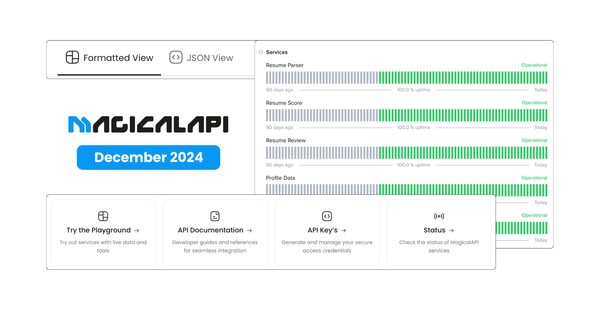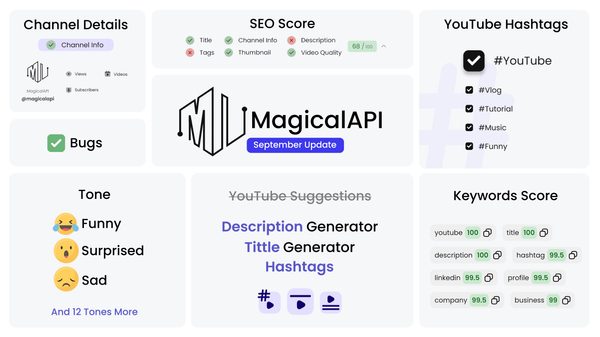SAT Score on Resume: Essential Tips for Job Seekers
Learn when to include SAT scores on your resume. Essential tips for recent graduates and job seekers to effectively showcase academic achievements and boost job applications.

Deciding whether to include an SAT score on your resume can be a critical choice for job seekers wanting to stand out. This topic has sparked debates among professionals about the relevance of standardized test scores in hiring. In today’s competitive job market, showcasing a mix of skills and academic achievements is essential, leading many to consider every detail of their resume carefully.
So, should you put your SAT score on your resume, and if so, when? This guide aims to answer common questions like "Should I put my SAT score on my resume?" to help you make the best choice for your job search.
✨ Unleash the Power of AI with MagicalAPI!
Whether you’re extracting LinkedIn data, or evaluating resumes, MagicalAPI is your one-stop solution! Discover the diverse range of AI services tailored to meet your every need. Dive in and elevate your digital experience today!

Advantages of Including SAT Scores on Your Resume
Including SAT scores on your resume can be very helpful for job seekers.
First, it shows your academic ability and your skill in standardized testing, which often matches up with important skills in many jobs.
Second, listing your SAT scores shows that you take initiative and are committed to high standards, traits that are attractive to employers who value dedication and hard work.
For recent graduates who don't have much work experience, SAT scores offer a measurable achievement that can strengthen their educational background. This is especially important when previous job experience isn't enough to stand out on its own. Additionally, for those applying to jobs in education or roles that need strong analytical skills, like research or academic administration, SAT scores can be particularly beneficial. They highlight your suitability for the role based on your proven academic abilities.
Disadvantages of Including SAT Scores on Your Resume
Including SAT scores on your resume might not always be a good idea and could have some disadvantages.
First, it might look like you're just trying to fill space, especially if the scores don't relate to the job you're applying for. This can make it seem like you don't have enough real achievements or relevant experience. For those with a lot of work experience, SAT scores are usually less important since employers care more about your professional accomplishments and skills you've gained over time.
Also, focusing too much on SAT scores can take attention away from more important achievements that matter more for the job. If your SAT scores are just average, it might create a negative impression and overshadow your other qualifications and skills. So, it's important to think carefully before deciding to include SAT scores on your resume.
When to Include SAT Scores
Including SAT scores on your resume can be a smart choice in certain situations. Here are some cases where adding your SAT scores might be helpful:
Recent Graduates
If you recently graduated and don’t have much work experience, putting your SAT scores on your resume can help make it stronger.
SAT scores give a clear measure of your academic abilities and can show employers your potential. This is especially useful if you don’t have many internships or job experiences to list.
Applying for Education Jobs
When applying for jobs in the education field, like teaching, tutoring, or school administration, SAT scores can be relevant. These scores can show your academic strengths and your understanding of standardized tests, which might be important for these roles.
Analytical or Technical Jobs
For jobs that need strong analytical or technical skills, such as positions in finance, consulting, engineering, or data analysis, high SAT scores in relevant sections (like math) can be a plus. They show that you have the skills needed for these types of jobs.
Competitive Entry-Level Jobs
In very competitive fields, like investment banking or management consulting, every detail can help you stand out. Including your SAT scores can set you apart from other candidates, especially if you have high scores. It shows that you have a high level of ability and can handle pressure well.
Companies That Ask for Them
Some employers, especially those with strict hiring processes, might ask for SAT scores as part of their application requirements. In these cases, you need to include your scores to meet the application requirements and be considered for the job.
By knowing when to include your SAT scores, you can make your resume more effective and improve your chances of getting noticed by potential employers.
Guidelines for Including SAT Scores
When you decide to include SAT scores on your resume, keep the following tips in mind to ensure they are presented effectively:
- Placement: Include your SAT scores in the education section of your resume. This keeps the information organized and easy for employers to find.
- Context: Provide context if relevant. For example, if you scored particularly high in a section that is pertinent to the job, highlight that achievement.
- Format: Clearly state the scores and the sections (e.g., “SAT Score: 1450/1600 - Math: 750, Evidence-Based Reading and Writing: 700”).
- Recency: Ensure that your scores are still relevant. For recent graduates, scores are typically more pertinent than for those who graduated many years ago.
When to Exclude SAT Scores
While including SAT scores on your resume can be beneficial in some cases, there are situations where it's better to leave them out. Here are some instances where you should consider excluding your SAT scores:
Experienced Professionals
If you have several years of work experience, your professional accomplishments and skills are typically more important to employers than your SAT scores. Employers in these cases are more interested in your job performance and the expertise you've gained over your career.
Irrelevant Job Roles
For positions that don't require strong academic or analytical skills, such as roles in the arts, customer service, or certain trades, SAT scores may not be relevant. Including them could make it seem like you're trying to pad your resume rather than showcasing relevant experience and skills.
Emphasis on Professional Qualifications
When applying for jobs that prioritize professional certifications, advanced degrees, or specific technical skills, SAT scores can distract from these more pertinent qualifications. Employers in specialized fields are more likely to value your professional training and expertise over standardized test scores.
Older Scores
If you took the SAT many years ago, the scores might no longer be relevant. As you gain more experience and develop professionally, your SAT scores become less indicative of your current abilities and potential. Employers will be more interested in your recent accomplishments and skills.

Alternatives to Including SAT Scores
If you decide not to include SAT scores on your resume, there are several other ways to showcase your skills and qualifications. Here are some effective alternatives:
Highlight Relevant Coursework
If you’re a recent graduate or have taken courses relevant to the job you’re applying for, list these courses on your resume. This can show employers that you have specific knowledge and skills pertinent to the role.
Showcase Internships and Work Experience
Even if you have limited full-time work experience, internships, part-time jobs, and volunteer work can demonstrate your abilities and work ethic. Highlight the tasks you performed and the skills you gained in these roles.
Professional Certifications
Include any certifications you have earned that are relevant to the job. Certifications can often be more impressive to employers than SAT scores, as they demonstrate specialized knowledge and commitment to your field.
Projects and Research
Describe any significant projects or research you have undertaken, especially those that are relevant to the job. Include details about your role, the skills you used, and the outcomes of these projects.
Skills Section
Create a dedicated skills section on your resume to list technical skills, language proficiencies, and other relevant abilities. Be specific about your level of expertise and provide examples of how you’ve used these skills in the past.
Extracurricular Activities
If you’ve been involved in clubs, sports teams, or other extracurricular activities, include these on your resume. Leadership roles, in particular, can demonstrate valuable skills such as teamwork, time management, and leadership.
Academic Achievements
Instead of SAT scores, you can list other academic achievements, such as a high GPA, dean’s list honors, scholarships, or awards. These can provide a snapshot of your academic performance and dedication.
Portfolios and Work Samples
For creative or technical roles, including a link to an online portfolio or providing work samples can be very effective. This allows employers to see your work firsthand and get a better sense of your abilities.
Strong References
Include references from professors, employers, or colleagues who can vouch for your skills and work ethic. A strong recommendation can often be more impactful than standardized test scores.
Cover Letter
Use your cover letter to highlight your most relevant experiences and skills. Explain why you’re a good fit for the role and provide examples of your accomplishments that are directly related to the job.
Use a Resume Scoring Tool
Utilize a resume scoring tool like Magical API Resume Score to evaluate the effectiveness of your resume. This tool provides feedback on various aspects of your resume, helping you optimize it for specific job applications and ensuring it highlights your most relevant qualifications and experiences.
Conclusion
The choice to include SAT scores should be based on whether they add value to your overall qualifications and match the job you're applying for. Tailoring your resume to highlight the most important aspects of your background is key. Make sure that every part of your resume, including the possible inclusion of SAT scores, serves a clear purpose in showing why you are a good fit for the role.
By considering these factors, you can make informed decisions that may improve your chances of success in the job market.
FAQ
- Should I put my SAT score on my resume?
It depends. Include SAT scores if you are a recent graduate with limited work experience, applying for education-related jobs, analytical or technical positions, or if an employer specifically requests them. - Where should I include my SAT scores on my resume?
Place your SAT scores in the education section. Clearly state your total score and the scores for individual sections if relevant. This keeps the information organized and easy to find. - How should I format my SAT scores on my resume?
Use a clear and concise format, such as: “SAT Score: 1450/1600 - Math: 750, Evidence-Based Reading and Writing: 700.” This makes it easy for employers to understand your scores at a glance.

Join to our community
By joining our Discord server, get assistance, and troubleshoot any challenges you may encounter while using our services.
Join us on Discord




